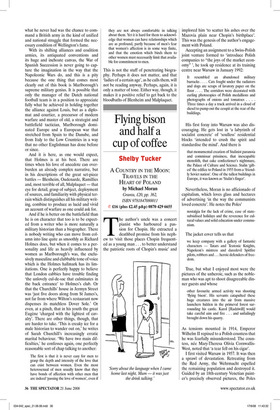A genius but not a hero
David Crane
MARLBOROUGH: ENGLAND’S FRAGILE GENIUS by Richard Holmes HarperPress, £25, pp. 564, ISBN 9780007225712 ✆ £20 (plus £2.45 p&p) 0870 429 6655 If anyone ever wondered why Marlborough has so seldom enjoyed the reputation his abilities warrant he could do a lot worse than start with Richard Holmes’s new biography. England’s Fragile Genius is probably as comprehensive an account of Marlborough as a single volume can hope to be, and yet at the end of 500-odd closely argued and sympathetic pages he remains so completely the creature of his age in all its factionalism, double dealing and venality, that it is hard to see him ever comfortably fitting the popular notion of the British hero.
Even those who dislike Wellington’s politics can hardly deny the consistency or integrity of the man, but Marlborough presents a different range of difficulties. It would be absurd to judge him by modern standards, but even in the age of the South Sea Bubble, Blenheim Palace was something of a facer. And then what is to be made of a man whose success was based so heavily on the largesse of one king’s mistress, the influence of a sister who was the mistress of another king, and of a wife who was the intimate — and hostile gossip suggested more than that — of the Queen? Of a courtier who owed everything to James II only to betray him in 1688? A Williamite who kept in touch with the deposed James? A captain general and leader of the grand alliance against France who flirted with the offer of a pension from Louis XIV? Which is he? The grasping and corrupt monster of the Tory pamphleteers or, as Richard Holmes suggests, a sort of martial Vicar of Bray writ large?
Marlborough’s popular standing might be higher if Britain could be persuaded to see Louis XIV in the same way it regards Napoleon, but here again he has been unlucky. In a long military career that only ended with the ’15, he fought with the French against the Dutch and the Dutch against the French, with the Catholic James against the Protestant Monmouth and the Protestant William against the Catholic James, but what he never had was the chance to command a British army in the kind of unified and national struggle that formed the necessary condition of Wellington’s fame.
With its shifting alliances and coalition armies, its antiquated conventions and its huge and inchoate canvas, the War of Spanish Succession is never going to capture the imagination in the way that the Napoleonic Wars do, and this is a pity because the one thing that comes most clearly out of this book is Marlborough’s supreme military genius. It is possible that only the manager of the Dutch national football team is in a position to appreciate fully what he achieved in holding together the alliance against Louis, but as a diplomat and courtier, a precursor of modern warfare and master of old, a strategist and battlefield tactician, Marlborough dominated Europe and a European war that stretched from Spain to the Danube, and from Italy to the Low Countries in a way that no other Englishman has done before or since.
And it is here, as one would expect, that Holmes is at his best. There are times when his love of anecdote can overburden an already complex narrative, but in his descriptions of the great set-piece battles — Blenheim, Oudenarde, Ramillies and, most terrible of all, Malplaquet — that eye for detail, grasp of subject, deployment of sources, and familiarity with physical terrain which distinguishes all his military writing, combine to produce as lucid and vivid an account of warfare as one could ask for.
And if he is better on the battlefield than he is on character that too is to be expected from a writer who is more naturally a military historian than a biographer. There is nobody writing who can move from column into line quite as smoothly as Richard Holmes does, but when it comes to a personality and life as heavily influenced by women as Marlborough’s was, the exclusively masculine and clubbable tone of voice which is the Holmes hallmark has its limitations. One is perfectly happy to believe that London cabbies have trouble finding ‘the unlovely cul-de-sac that culminates in the back entrance’ to Holmes’s club. Or that the Churchills’ house in Jermyn Street was ‘just five doors along from St James’s, not far from where Wilton’s restaurant now dispenses its matchless Dover Sole.’ Or even, at a pinch, that in his youth the great Eugène ‘charged with the lightest of cavalry’. There are other things, though, that are harder to take. ‘This is creaky ice for a male historian to wander out on,’ he writes of Sarah Churchill’s increasingly erratic marital behaviour. ‘We have two main difficulties,’ he confesses again, one perfectly reasonable sort of chap talking to another:
The first is that it is never easy for men to grasp the depth and intensity of the love that can exist between women. Even the most heterosexual of men usually know that they have bonds of affection with other men that are indeed ‘passing the love of women’, even if they are not always comfortable in talking about them. Yet it is hard for them to acknowledge that women can have relationships which are as profound, partly because of men’s fear that women’s affection is in some way finite, and that the emotion which binds them to other women must necessarily limit that available for commitment to men.
This is not the stuff of penetrating biography. Perhaps it does not matter, and that ‘ladies of a certain age’, as he calls them, will not be reading anyway. Perhaps, again, it is only a matter of tone. Either way, though, it makes it a positive relief to get back to the bloodbaths of Blenheim and Malplaquet.











































































 Previous page
Previous page